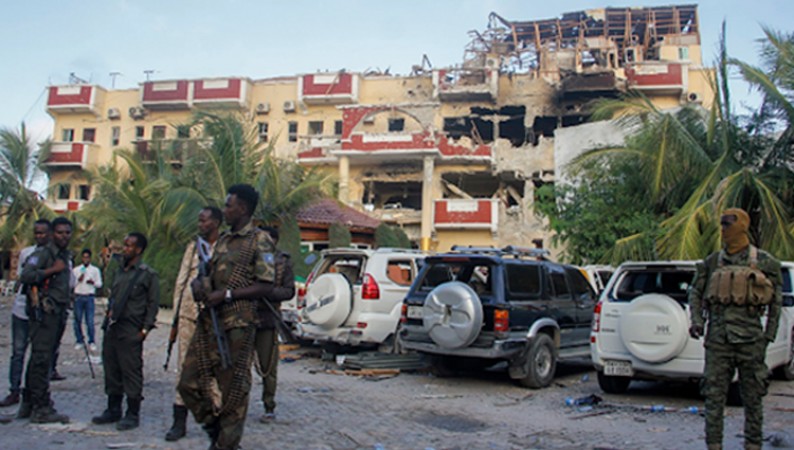
Somalia: The death toll from the siege of an al-Shabaab jihadist at a hotel in Somalia's capital Mogadishu has risen to 21, according to Health Minister Ali Haji Aden, with concerned citizens awaiting word on missing relatives on Sunday.
Parts of the structure collapsed as an al-Qaeda-linked group's gun and bomb attack on the popular Hyatt hotel collapsed, with many people feared trapped inside since the attack began on Friday evening.
According to Aden, "The Ministry of Health has confirmed 21 deaths and 117 people injured so far."
On Sunday, emergency personnel and bomb disposal experts searched the heavily damaged hotel for explosives and removed debris while security forces patrolled the area.
According to Police Commissioner Abdi Hassan Mohamed Hijar, "106 people including children and women were rescued" during the siege, which ended around midnight.
As gunfire and flames broke out in the hotel, security forces searched for civilians, including three young children, who were hiding inside the toilet.
"Most of the casualties occurred in the early hours of the attack, after which security forces spent time isolating people and rescuing rooms," Hijar explained.
It was the biggest attack in Mogadishu since Somalia's new president, Hassan Sheikh Mohamed, took office in June, and highlighted the difficulty of ending the Islamist group's 15-year insurgency.
Dozens of people arrived at the hotel on Sunday morning hoping to hear from family members.
"It's like the devastation caused by a major earthquake..." In most places, you can only see the damaged columns standing," said nurse Sadiq Ahmed, who lost his uncle in the attack.
"My uncle was murdered in the reception area, he was shot."
The hotel was a popular meeting place for government officials, and when a suicide bomber detonated a massive explosion, many were inside to enter the compound with heavily armed gunmen.
Witnesses said a second explosion occurred minutes later when rescue teams, security forces and civilians rushed to help the injured.
Abdifatah Mohamed, a civil servant, said he had just sat down with a friend and ordered a cappuccino when he heard a loud explosion and gunshots.
"The gunmen went straight to the lobby area in the main building, where they were randomly shooting people," he described the horrific ordeal.
He and a dozen others found shelter near the toilet before being rescued 40 minutes later.
The United States, Britain, the European Union and Turkey, as well as the United Nations, all strongly condemned the attack, as did ATMIS, with the African Union force seeking to assist Somali forces in taking on primary security responsibility by the end of 2024. assigned the task. ,
Earlier this month, Washington announced that 13 members of al-Shabaab had been killed in an airstrike, the latest since US President Joe Biden ordered the re-establishment of a US military presence in Somalia. reversed a decision made by predecessor Donald Trump. ,
The "audacious attack", according to Samira Gaid, executive director of the Hiral Institute, a security think tank in Mogadishu, was a message to the new government and its foreign allies.
"The complex attack is meant to demonstrate that they are still very much present, very relevant, and that they can penetrate government security and carry out such attacks."
"The difference between this attack and previous attacks is the length of the siege and how long it took security forces to control the situation," she said.
Even for the city regularly targeted by al-Shabaab, the length of the siege has been "very painful".
Last month, Mohamed said ending the insurgency would require more than a military approach, but that his government would only negotiate with the group at the right time.
Somalia is also facing famine, the region's worst drought in 40 years, putting nearly half of the country's 15 million people at risk of starvation.
According to al-Shabaab spokesman Abdiaziz Abu-Musab, the group killed more than 40 people during the siege of the hotel.
Since Mohamed's election, jihadists have launched several attacks in Somalia, and last month launched attacks on the Ethiopian border.
Terrorists were driven out of Mogadishu in 2011, but they still control large areas of the countryside and have the ability to launch often deadly attacks against hotels and restaurants.
The deadliest attack was in Mogadishu in October 2017, when a truck loaded with explosives exploded, killing 512 people.
12 people are killed as Somali forces fight al-Shabab at a hotel under siege in Mogadishu